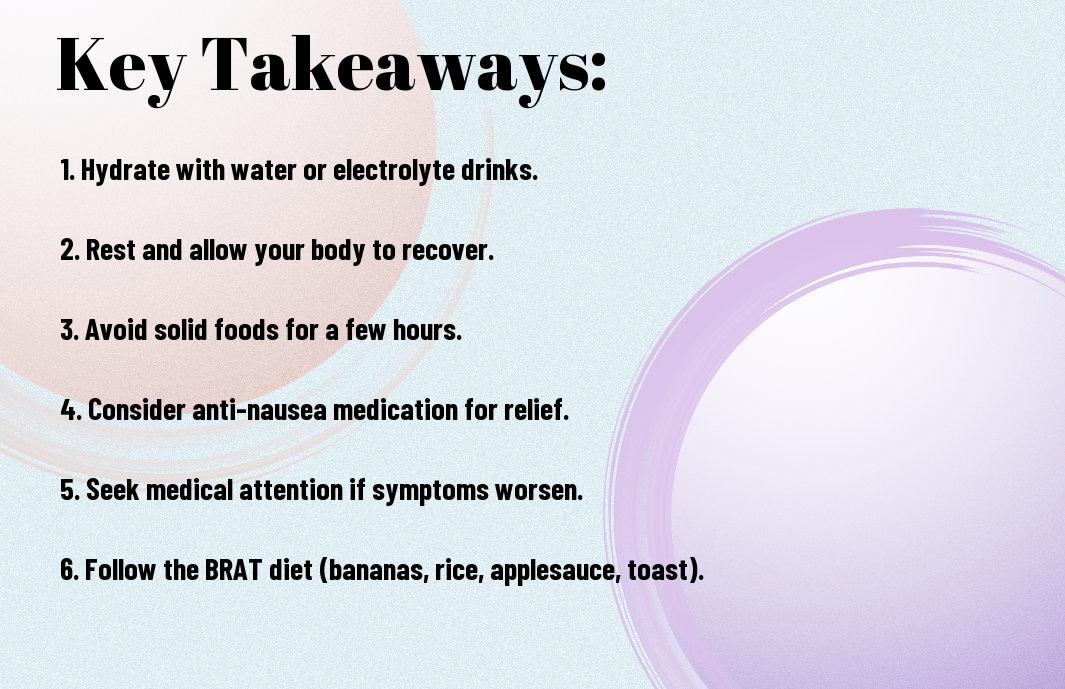It’s crucial to know how to quickly alleviate the symptoms of food poisoning. When you find yourself experiencing nausea, vomiting, diarrhea, and stomach cramps after consuming contaminated food, there are steps you can take to help your body recover swiftly. In this article, you will learn the fastest ways to resolve food poisoning, so you can start feeling better and get back to your usual self in no time.
Key Takeaways:
- Seek medical attention: If you suspect food poisoning, it is crucial to see a doctor to receive proper treatment and avoid complications.
- Stay hydrated: Drink plenty of fluids such as water, clear broths, or electrolyte solutions to prevent dehydration caused by vomiting and diarrhea.
- Avoid solid foods: Give your stomach time to rest by sticking to a bland diet of crackers, toast, and bananas until symptoms improve.
Identifying Food Poisoning
A crucial first step in resolving food poisoning is identifying the condition. Food poisoning occurs when you consume contaminated food or beverages that are tainted with harmful bacteria, viruses, parasites, or toxins. It can lead to a range of unpleasant symptoms that typically manifest within hours after consuming the contaminated food.
Common Symptoms
On your journey to resolving food poisoning quickly, it’s vital to recognize the common symptoms associated with this condition. Symptoms may include nausea, vomiting, diarrhea, stomach cramps, fever, and headache. These symptoms can vary in severity depending on the type of contaminant and your body’s response to it. In some cases, you may also experience dehydration due to the loss of fluids from vomiting and diarrhea.
When to Seek Medical Attention
To expedite the process of resolving food poisoning, it’s important to know when to seek medical attention. While most cases of food poisoning resolve on their own within a few days with rest and hydration, there are instances where medical intervention is necessary. If you experience severe or persistent symptoms such as high fever, blood in your stools, inability to keep liquids down, or signs of dehydration, it is crucial to seek medical help promptly.
Seeking medical attention is especially important for vulnerable populations such as young children, elderly individuals, pregnant women, and individuals with weakened immune systems, as they may be at higher risk of complications from food poisoning.
Causes of Food Poisoning
Some of the most common causes of food poisoning include bacterial contamination, viral infections, parasitic infections, and food handling errors.
Bacterial Contamination
On occasion, harmful bacteria can find their way into the food you eat. These bacteria can multiply rapidly in food left at room temperature, leading to food poisoning when consumed. Common culprits include Salmonella, E. coli, and Listeria.
Viral Infections
Any food that has been handled by someone infected with a virus can potentially spread the virus and cause food poisoning. Viral infections like norovirus are highly contagious and can easily spread through contaminated food or surfaces.
For instance, norovirus can survive on surfaces for weeks and is resistant to many common disinfectants, making it important to practice good hygiene and proper food handling to avoid contamination.
Parasitic Infections
Contamination of food or water with parasites such as Giardia or Cryptosporidium can also lead to food poisoning. These parasites can cause symptoms like nausea, diarrhea, and stomach cramps when ingested.
Food from contaminated water sources or improperly cooked meat can introduce these parasites into your system, causing illness.
Food Handling Errors
Food that is not stored, handled, or cooked properly can become a breeding ground for harmful bacteria or viruses. Cross-contamination, where juices from raw meat come into contact with cooked food, can also lead to food poisoning.
Another common error is not washing your hands before handling food, which can transfer bacteria and viruses from your hands to the food you are preparing, increasing the risk of food poisoning.
Home Remedies for Quick Relief
Once again, if you suspect you have food poisoning, it’s necessary to consult a healthcare professional. For more information on the diagnosis and treatment of food poisoning, you can refer to Food poisoning – Diagnosis and treatment.
Staying Hydrated
On the road to recovery from food poisoning, staying hydrated is crucial. Dehydration is a common concern with food poisoning due to vomiting and diarrhea. Sip on clear fluids like water, herbal teas, or electrolyte-rich drinks to replenish lost fluids and electrolytes.
Resting the Stomach
Resting your stomach is key to allowing it time to recover. Avoid solid foods for a while and opt for easy-to-digest options like broth-based soups or crackers. Give your stomach a break until you start feeling better and gradually introduce solid foods back into your diet.
Staying hydrated is necessary during food poisoning to prevent dehydration. Remember to drink small amounts of fluids frequently and avoid beverages that can worsen dehydration, such as caffeinated or alcoholic drinks.
Ginger and Other Natural Anti-Inflammatories
Any natural remedies that help calm inflammation in the stomach can aid in relieving symptoms of food poisoning. Ginger, in particular, has been known for its anti-inflammatory properties and can help soothe an upset stomach. Other options include peppermint tea or chamomile tea, which are gentle on the stomach.
Stomach-friendly foods and natural anti-inflammatories can provide relief from the discomfort caused by food poisoning. Be mindful of what you consume during recovery to support your stomach’s healing process.
Activated Charcoal
The use of activated charcoal is sometimes recommended to help bind toxins in the gut and prevent their absorption. Activated charcoal is known for its ability to adsorb toxins, making it a popular choice for relieving symptoms of food poisoning. However, consult with a healthcare provider before using it, as it may interact with certain medications or conditions.
The efficacy of activated charcoal in treating food poisoning lies in its ability to bind to toxins and prevent their absorption in the digestive system. It is necessary to use activated charcoal as directed and under medical supervision to avoid any potential side effects.
Natural
Medical Treatment Options
Antibiotics for Bacterial Infections
Medical treatment for food poisoning caused by bacterial infections often involves the use of antibiotics. If your healthcare provider determines that your symptoms are due to a bacterial infection, they may prescribe antibiotics to help your body fight off the harmful bacteria.
Anti-Diarrheal Medications
Medications can be used to help manage symptoms such as diarrhea that often accompany food poisoning. Anti-diarrheal medications work by slowing down the movement of your intestines, which can help reduce the frequency of diarrhea and make you more comfortable.
However, it’s important to note that while anti-diarrheal medications can provide relief from symptoms, they do not treat the underlying cause of food poisoning. It is imperative to consult with a healthcare professional before taking any medications to ensure they are appropriate for your specific situation.
IV Fluids for Severe Cases
Severe cases of food poisoning, especially those accompanied by persistent vomiting and diarrhea, may lead to dehydration. In such situations, intravenous (IV) fluids may be necessary to rehydrate your body and restore electrolyte balance. IV fluids deliver fluids directly into your bloodstream, helping to quickly replenish lost fluids and electrolytes.
To determine the appropriate treatment, it’s crucial to seek medical attention if you experience severe symptoms of food poisoning. Your healthcare provider will assess your condition and recommend the best course of action to help you recover quickly and safely.

Preventing Future Episodes
To What to Eat After Food Poisoning, it is crucial to take steps to prevent future episodes. By following safe food handling practices, you can reduce the risk of food poisoning and protect yourself from harmful bacteria. Additionally, avoiding high-risk foods can further lower the chances of falling ill from contaminated food sources.
Safe Food Handling Practices
With safe food handling practices, you can minimize the risk of food poisoning. Make sure to wash your hands thoroughly before and after handling food, especially raw meats. Keep utensils and surfaces clean by washing them with hot, soapy water. Separate raw foods from cooked foods to prevent cross-contamination, and cook foods to their recommended internal temperatures.
Avoiding High-Risk Foods
The best way to prevent food poisoning is to avoid high-risk foods such as raw or undercooked meats, seafood, and eggs. Dairy products that are unpasteurized and fruits and vegetables that are not thoroughly washed can also pose risks. By being mindful of these high-risk foods and ensuring they are cooked or handled properly, you can greatly reduce the likelihood of foodborne illnesses.
Preventing future episodes of food poisoning involves taking precautions to safeguard your health. By following safe food handling practices, avoiding high-risk foods, and boosting your immunity, you can significantly lower the risk of falling ill from contaminated foods.
Boosting Immunity
Immunity plays a crucial role in protecting your body from harmful bacteria that can cause food poisoning. To boost your immunity, make sure to maintain a balanced diet rich in fruits, vegetables, whole grains, and lean proteins. Stay hydrated, get regular exercise, and ensure an adequate intake of vitamins and minerals to support your immune system.
Plus, consider incorporating probiotics into your diet to promote healthy gut flora, which can aid in digestion and strengthen your body’s defenses against pathogens. By taking steps to boost your immunity, you can help protect yourself from foodborne illnesses and reduce the likelihood of experiencing food poisoning episodes in the future.

Complications and Long-Term Effects
Dehydration and Electrolyte Imbalance
LongTerm If food poisoning is severe and leads to continuous vomiting and diarrhea, you may experience dehydration and electrolyte imbalance. Dehydration occurs when your body loses more fluid than it takes in, while electrolyte imbalance refers to the disruption of minerals in your body that are important for various bodily functions. These complications can be dangerous if not addressed promptly.
Kidney Failure and Other Organ Damage
Imbalance In severe cases of food poisoning, kidney failure and other organ damage can occur. Kidney failure happens when your kidneys are unable to filter waste from your blood, leading to a buildup of toxins in your body. Other organs, such as the liver and heart, may also be affected by the toxins released during a severe food poisoning episode.
Other If kidney failure and organ damage occur as a result of food poisoning, you may require intensive medical treatment, including dialysis to support kidney function. It’s important to seek immediate medical attention if you experience symptoms of organ damage after a bout of food poisoning.
Chronic Health Conditions
Failure In some rare cases, food poisoning can lead to the development of chronic health conditions such as irritable bowel syndrome (IBS) or reactive arthritis. These conditions can cause long-lasting discomfort and may require ongoing medical management. If you notice persistent gastrointestinal issues or joint pain following a case of food poisoning, it’s crucial to consult with a healthcare provider for proper diagnosis and treatment.
Dehydration Overall, while most cases of food poisoning resolve on their own within a few days, it’s important to be aware of potential complications and long-term effects. Taking steps to prevent food poisoning, such as practicing proper food safety and hygiene, can help reduce your risk of experiencing severe symptoms or developing complications from contaminated food.

To wrap up
Hence, when facing food poisoning, the fastest way to resolve it is by staying hydrated, resting, and letting your digestive system clear out the toxins. It’s important to avoid solid foods for a while and stick to clear liquids to prevent further irritation. If symptoms persist or worsen, it’s crucial to seek medical attention to rule out any serious complications.
FAQ
Q: What are the symptoms of food poisoning?
A: Symptoms of food poisoning may include nausea, vomiting, abdominal cramps, diarrhea, fever, and weakness. It is important to seek medical attention if you experience severe symptoms or symptoms that worsen over time.
Q: How can I quickly resolve food poisoning symptoms?
A: The fastest way to resolve food poisoning is to stay hydrated by drinking plenty of water or electrolyte-replenishing drinks. Rest and avoid solid foods for a few hours to give your digestive system a break. If symptoms persist or worsen, seek medical attention.
Q: When should I seek medical help for food poisoning?
A: You should seek medical help for food poisoning if you experience severe symptoms such as high fever, bloody vomit or stool, dehydration, persistent vomiting that prevents you from keeping liquids down, or if your symptoms do not improve within a day or two.



